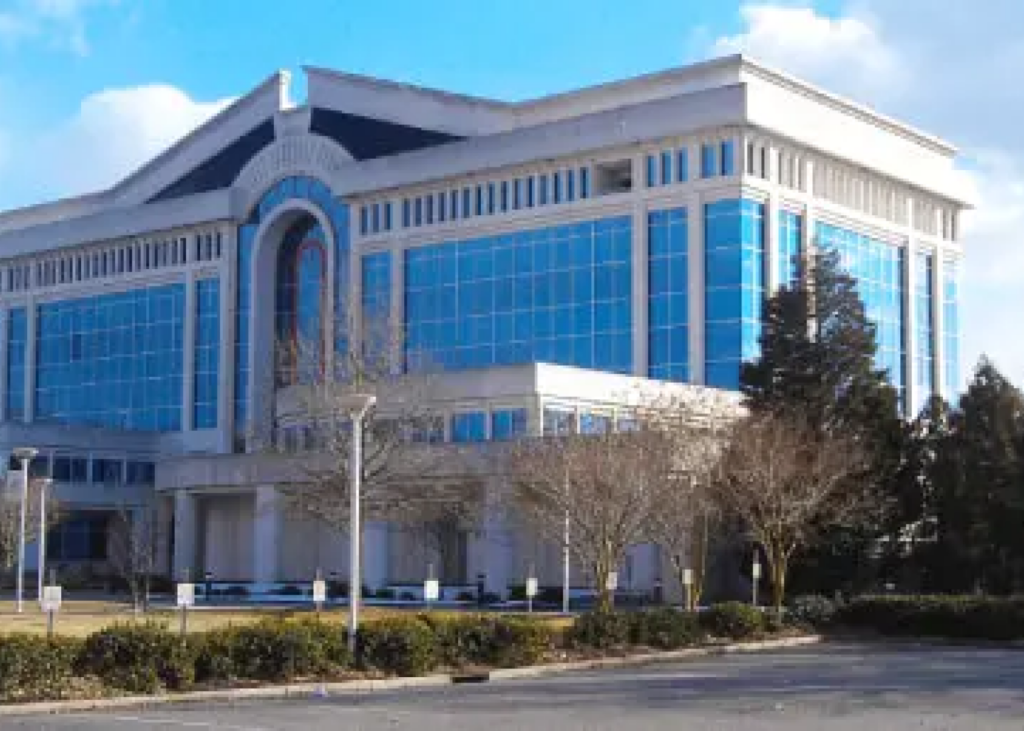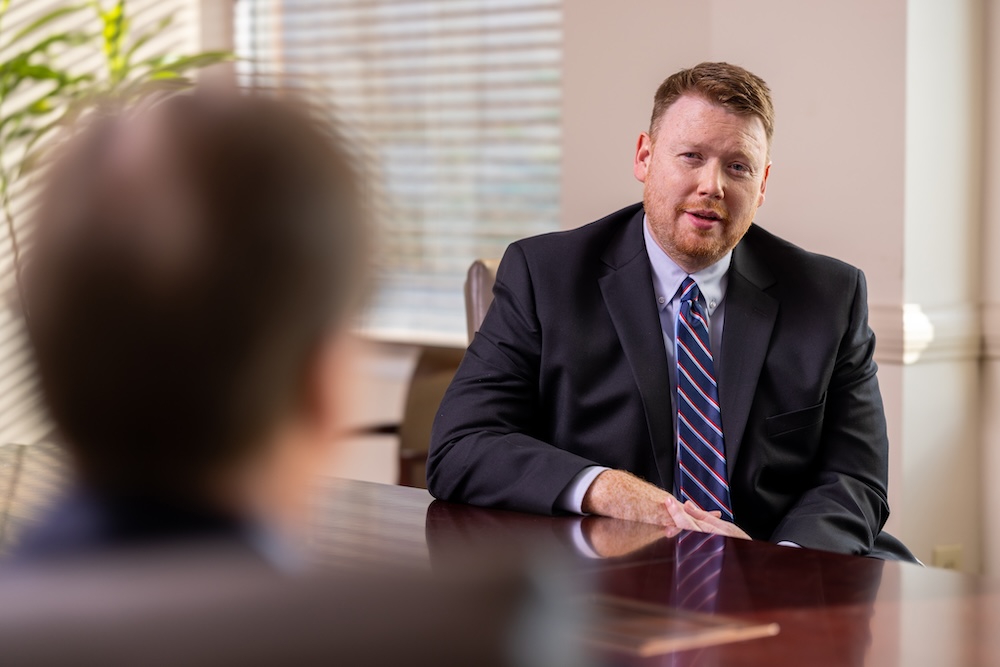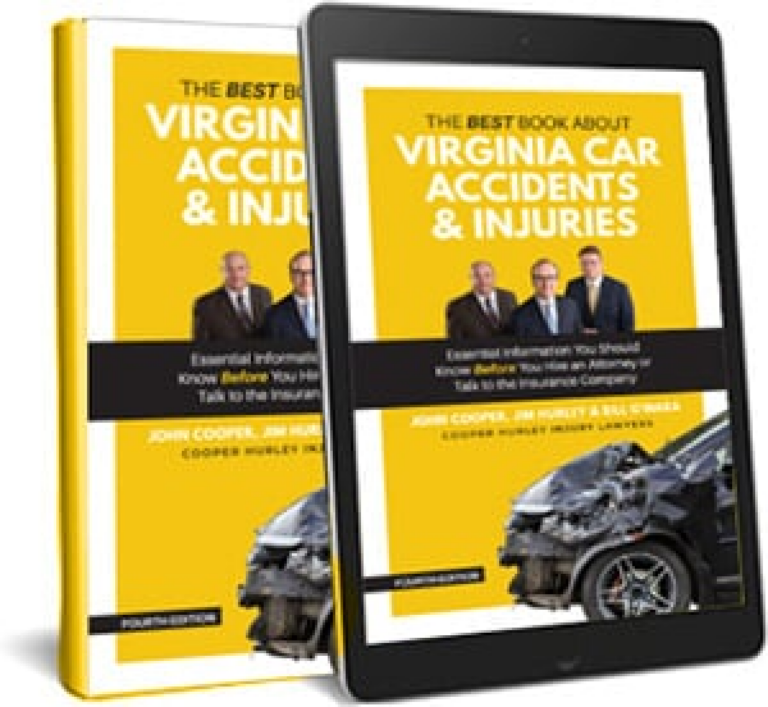Chesapeake Personal Injury Lawyer

On This Page
The skilled Chesapeake personal injury lawyers at Cooper Hurley Injury Lawyers have decades of experience representing accident victims and families across Hampton Roads, Virginia. We have led our clients to tens of millions of dollars in life-changing results.
Have you recently suffered injuries or experienced the tragic loss of a family member in a Chesapeake, Virginia, accident? Call Cooper Hurley Injury Lawyers for help right away. You may be entitled to compensation for lost wages, medical treatment, and other damages related to your pain and suffering. An experienced Chesapeake personal injury lawyer can fight to get you maximum compensation for your harms and losses.
Cooper Hurley Injury Lawyers has been a leader in personal injury litigation in Chesapeake and the surrounding cities in Hampton Roads and coastal Virginia. Our award-winning attorneys have gained national recognition for their ability to achieve top results for clients in cases involving car accidents, railroad accidents, truck accidents, bus accidents, spinal cord injuries, wrongful death, and other matters of negligence.
We have won tens of millions of dollars on behalf of our clients, including many seven-figure results. Benefit from a team with over 120+ years of combined experience by calling our Chesapeake, Virginia, law office. Set up a free consultation with a member of our skilled team now.
Personal Injury Law Is All We Do
At Cooper Hurley Injury Lawyers, we have dedicated our careers to advocating for accident victims and grieving families after devastating injuries have changed the course of their lives forever. Plaintiff’s personal injury cases and litigation is all we do—and we never represent insurance companies.
Our clients are the lifeblood of our law firm. Our goal is simple: to make a genuine difference in the lives of the people we represent. It is one of the reasons our client satisfaction is unparalleled.
Here is why you want our Chesapeake personal injury lawyers to represent you:
- We have won tens of millions of dollars in jury verdicts and private settlements for our clients.
- Our law firm obtained the largest single reported car accident recovery ($6.5 million) of 2020.
- Collectively, our top-rated Virginia trial attorneys have 128 years of experience.
- Founding partners John Cooper and Jim Hurley have been recognized as Top Lawyers of Coastal Virginia in 2023.
- Our team has achieved some of the most respected designations in the legal field, including Super Lawyers, Top 100 Trial Lawyers, and Lawyers of Distinction for work in Personal Injury Law.
You deserve to work with a law firm invested in your case and willing to go above and beyond to get you a favorable outcome. That is why Cooper Hurley Injury Lawyers should be your first call. Contact our meeting location in Chesapeake to begin the process today.

Our Chesapeake Personal Injury Practice Areas
Always seek prompt medical treatment after you have been hurt in an accident in Chesapeake, Virginia. This simple step can ensure that your injuries are properly diagnosed and treated, as well as provide strength to a future claim for damages.
Once you are stable, don’t delay in reaching out to our Chesapeake personal injury lawyers to discuss your legal rights and options.
How Can a Chesapeake Personal Injury Lawyer Help Me?
Statistically speaking, you are more likely to win your personal injury case when you hire a lawyer. Insurance companies also acknowledge that payouts are higher when a personal injury attorney is involved. Why does hiring a personal injury lawyer in Chesapeake make such a huge difference?
- The insurance company isn’t on your side. Hiring a lawyer puts an experienced advocate in your corner and helps put you on a level playing field.
- You have a good chance of being blamed for your accident. Your attorney can anticipate these victim-blaming tactics and work to disprove these claims.
- Your attorney will have access to resources, information, and experts that you don’t, which can give you a leg up throughout the claims process.
- You will benefit from a thorough, exhaustive investigation into your accident, which ensures that the insurance company doesn’t control the narrative.
You have just suffered serious, potentially life-changing injuries in your accident. You need—and deserve—the opportunity to rest and recover. That is difficult when you are trying to battle an insurance company (and/or other parties) in a fight for compensation without the help of a lawyer.
When you hire a personal injury attorney in Chesapeake, Virginia, you give yourself the best opportunity. We will handle every aspect of your injury case, fighting to get you maximum compensation while you recover.
Car Accidents Are a Leading Cause of Accident Injury in Chesapeake
Motor vehicle accidents are a leading cause of accidental injury and death in Virginia.
Chesapeake certainly has its share of high-speed traffic and congestion, especially along I-64, I-664, I-464, US 460, US Route 17, and other busy roads such as Greenbrier Parkway, Volvo Parkway, Battlefield Boulevard, Great Bridge Boulevard, S. Military Highway, Mount Pleasant Road, George Washington Highway, Dock Landing Road, Centerville Parkway, and Western Branch Boulevard.
Traffic jams and collisions happen at high rates near our waterways and bridges, including the South Norfolk Jordan Bridge, Deep Creek Bridge, Gilmerton Bridge, and High Rise Bridge.
These arteries provide ample opportunity for negligent drivers to cause accidents and resulting injuries through:
- Aggressive driving and speeding
- Distracted driving
- Drunk driving
- Fatigued driving
- Reckless driving
- Texting while driving
If you have been injured in a crash, our Chesapeake car accident lawyers and Chesapeake motorcycle accident lawyers can help you work toward a meaningful financial recovery.
What Types of Damages Can a Chesapeake Injury Lawyer Help Me Recover?
While some exceptions exist—like cases involving workers’ compensation or wrongful death—there are typically two types of compensation available in Chesapeake personal injury cases: compensatory and punitive.
Compensatory Damages
Injury case compensatory damages fall into two distinct categories: economic and non-economic.
Economic damages offset the verifiable (and projectable) financial losses related to your case, such as:
- Medical bills (past and future)
- Lost wages (past and future)
- Therapy and rehabilitation (past and future)
- Reduced or diminished earning capacity
Noneconomic damages are paid to make up for the changes and trauma related to your accident that are more personal and, therefore, more difficult to value. Examples include payment for:
- Pain and suffering
- Emotional distress
- Reduced quality of life
- Disfigurement and loss of limbs
- Scarring
- Post-traumatic stress disorder
- Fright
- Inconvenience
- Pregnancy Injuries
A lot of disagreement can arise over the value of non-economic and economic damages. Our Chesapeake personal injury attorneys often work closely with experts and specialists throughout the process. They provide insight into your case so we understand how you have been affected and, in turn, what your case is worth.
Punitive Damages
Unlike compensatory damages, which are awarded to compensate you for your injuries, harms and losses, punitive awards are paid to punish the defendant and send a message to the community that some bad conduct will not be tolerated.
In Virginia, punitive damages can only be awarded in a personal injury or wrongful death cases under limited circumstances. An example would be when an at-fault driver’s conduct is considered “willful or wanton” in that they showed a “conscious disregard for the rights of others.” You might see punitive damages awarded in cases involving:
- Drunk driving car accidents
- Fatal car or bus accidents
- Hit-and-run car accidents
- Virginia State law caps awards for punitive damages at $350,000.
Frequently Asked Questions
After an unexpected accident, you are bound to have many questions about your rights and options. Our respected Virginia personal injury attorneys in Chesapeake have addressed here some of the questions we are asked most often. If you have additional questions about your specific situation, reach out to a member of our team today for a free consultation.
What must be true for a Chesapeake, Virginia, personal injury case to succeed?
A Chesapeake personal injury case is a type of insurance claim or lawsuit brought by an injured person against another person or business (or their insurance company). If a person or business acts with negligence that results in injuries to another, a claim for damages can be made in many instances. To have a successful Chesapeake personal injury claim, the following elements must be present:
- The person or business that caused the injury must have a duty of care owed to another person.
- The person or business negligently violated that duty of care.
- That violation of the duty of care resulted in personal injuries, harm, and other losses.
In Virginia, as the victim, you have the burden of proving negligence by a preponderance of the evidence. A jury has to find that your side of the story is more likely true than not.
Our Chesapeake personal injury attorneys have represented hundreds of clients in negligence actions across the state. We know how to investigate your case, obtain the necessary evidence, and build an argument that sets you up for your best shot at a successful financial recovery.
Contact our law office in Chesapeake, Virginia, to learn more about how you can benefit from our extensive experience.
What is the statute of limitations for personal injury cases in Virginia?
In Virginia, you typically have two years to file a personal injury or wrongful death lawsuit. The statute of limitations may differ in some instances, which could give you more or less time to take action. Once time runs out, you forfeit the opportunity to assert your legal rights and recover the compensation you need.
How much does it cost to hire a Chesapeake personal injury lawyer?
Hiring the Chesapeake personal injury attorneys at Cooper Hurley Injury Lawyers has no out-of-pocket cost. We represent accident victims in Chesapeake on a contingency fee basis. We are so confident that we will win your personal injury case that you don’t pay us unless we do. If we don’t win, you don’t pay. End of story. When we negotiate a settlement or win a jury verdict in your favor, our fee comes out of your financial award.
Can I recover compensation if I’m partly to blame for an accident in Chesapeake, Virginia?
In most cases, no. Virginia is one of a handful of states to adopt a pure contributory fault system. If an injured person shares any fault, even merely 1 percent, he is barred from recovery in most circumstances in Virginia. This is why a prompt and thorough investigation is important.
However, limited exceptions apply, like some cases involving railroad workers.

Ask The Car Crash Experts
Bill O'Mara, Personal Injury Lawyer
“If you share any fault in causing your own injuries, a judge or jury may rule that you are contributorily negligent. So even if the other driver was very negligent or mostly negligent, if you share any fault, you are barred from any recovery in Virginia. Virginia is one of the few states left in the country that adhere to that difficult, harsh rule. With that said, just because there’s an argument that you shared some fault, that doesn’t mean that’s true. And a jury or a judge might decide that your negligence or shared negligence was not a proximate cause or cause of your injury. And if a judge or a jury were to rule that way, you can still successfully recover. So it can get very complicated. And if you may, so you want to consult with experienced personal injury lawyer to work through that and try to craft the best argument possible that you did not actually share any fault in causing your injuries.”
Experienced Chesapeake Personal Injury Lawyers Ready To Fight for You
Are you struggling with painful, debilitating physical injuries or paralysis because someone else was careless? Have you lost a close family member in a fatal accident in Chesapeake, Virginia? You may be entitled to compensation, and Cooper Hurley Injury Lawyers is ready to help you get every cent you deserve.
Our award-winning Chesapeake personal injury attorneys have the experience and passion for justice to get you the best results in your case. We will take on the insurance company, hospital, corporation, employer, or anyone who tries to stand between you and a meaningful financial recovery while you take this time to focus on getting better.
Contact our location in Chesapeake, Virginia, today to arrange a free consultation. We are standing by to help 24 hours a day.
Free eBook

Get a free copy of “The Best Book About Virginia Car Accidents & Injuries”
Learn what to do after an accident, how to deal with insurance agencies, and when to get help. Download your free copy of The Best Book About Virginia Car Accidents & Injuries.
Testimonials





